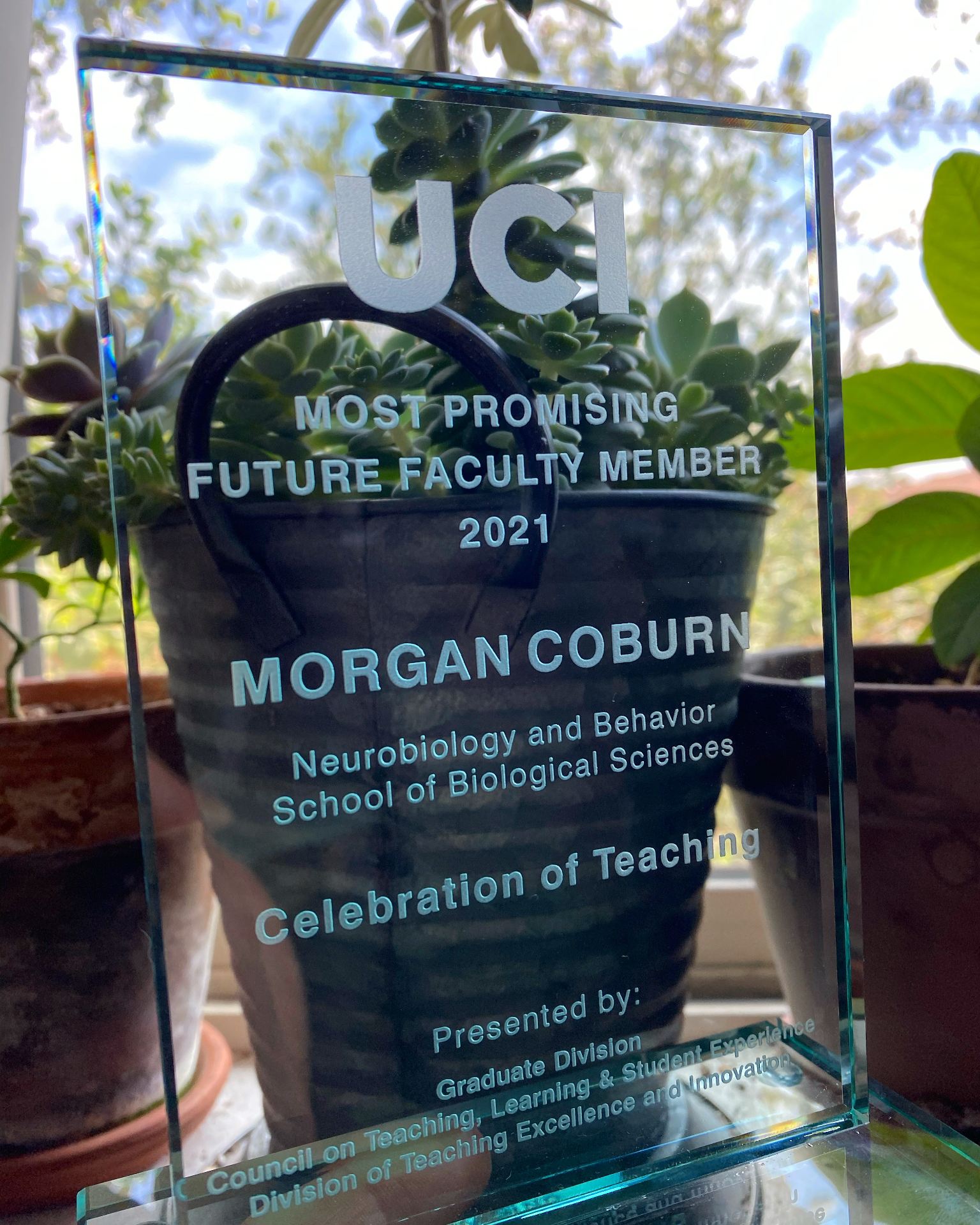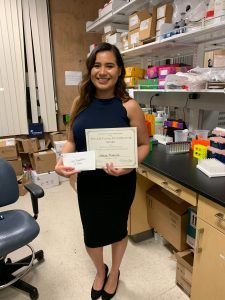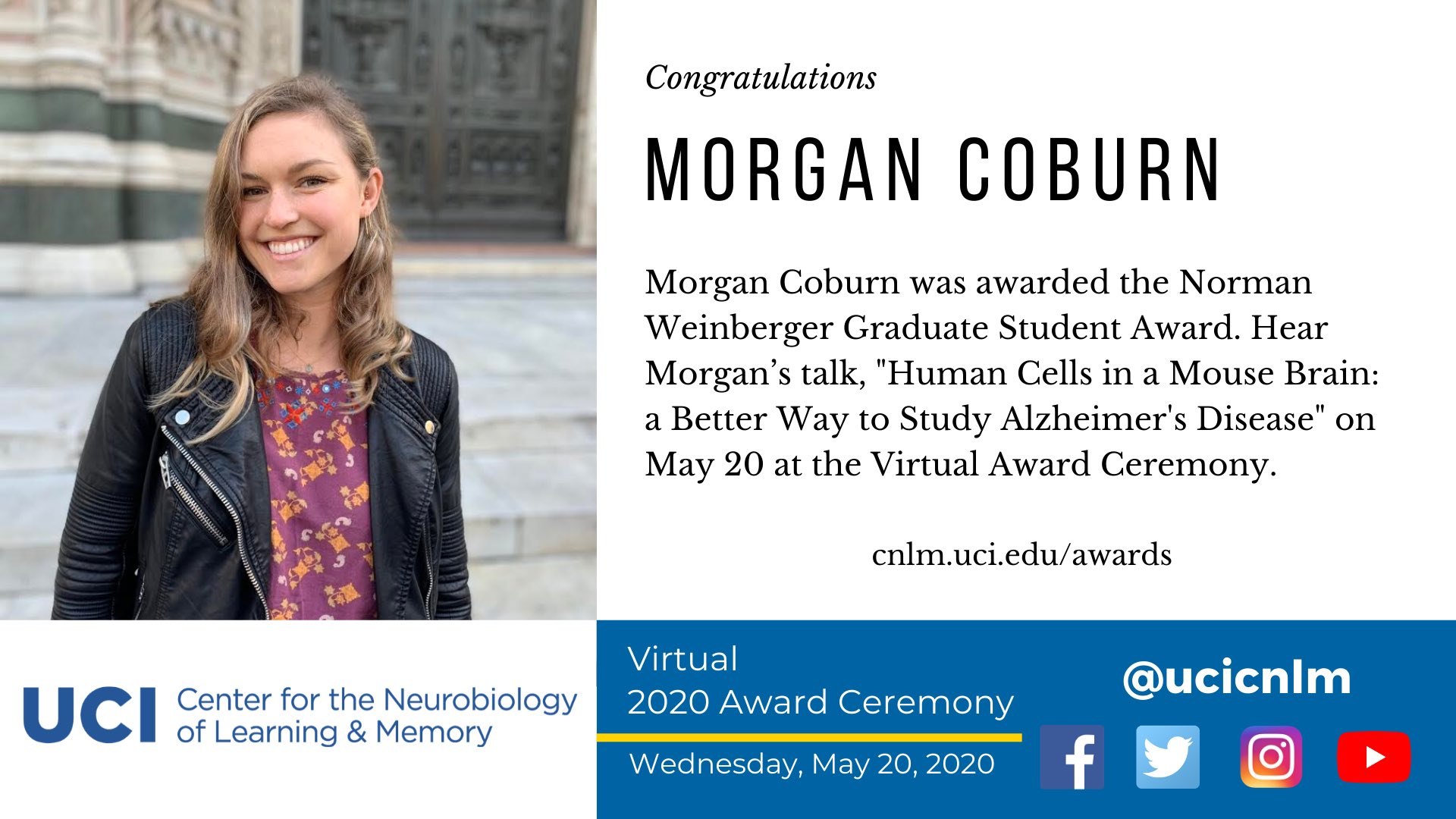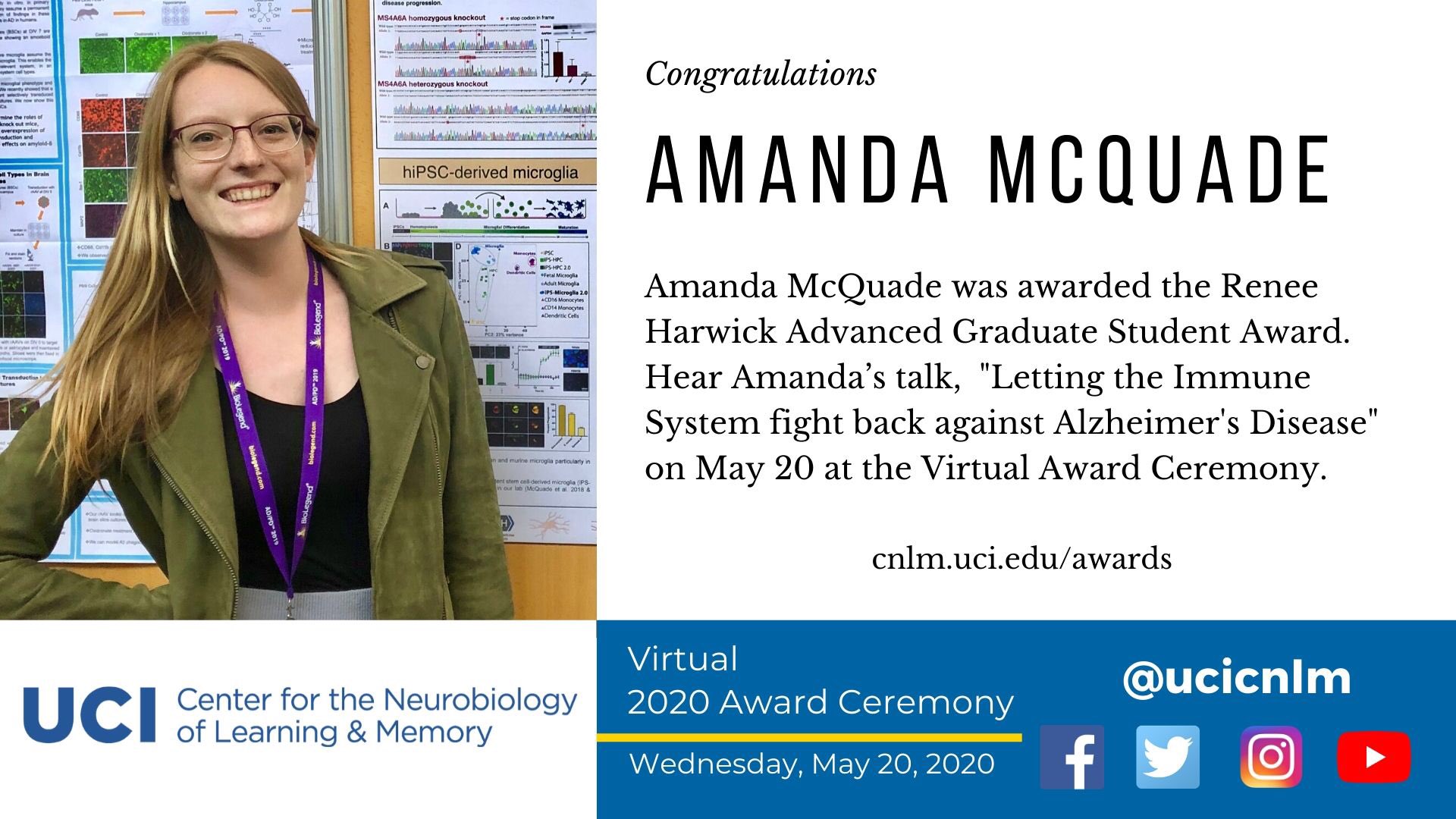Grants are awarded to students whose research, teaching, and/or service supports diversity, equity, and inclusion and contributes to UCI’s effort to open opportunities for under-represented groups in higher education.
Amanda McQuade receives the 2021 James L. McGaugh Award
 Amanda McQuade receives the 2021 James L. McGaugh Award for her publication studying TREM2 in human iPS-Microglia: https://www.nature.com/
Amanda McQuade receives the 2021 James L. McGaugh Award for her publication studying TREM2 in human iPS-Microglia: https://www.nature.com/
Morgan Coburn recognized as “Most Promising Future Faculty”
 Congratulations to Angeline Duke and Morgan Coburn for winning the 2021 Most Promising Future Faculty Award! The Most Promising Future Faculty Award recognizes graduate students who show great promise through their effectiveness as instructors or teaching assistants.
Congratulations to Angeline Duke and Morgan Coburn for winning the 2021 Most Promising Future Faculty Award! The Most Promising Future Faculty Award recognizes graduate students who show great promise through their effectiveness as instructors or teaching assistants.
Morgan Coburn is currently a Ph.D. candidate in the Department of Neurobiology and Behavior. Her teaching experience is off the charts, having served in ten different teaching capacities. Her research focuses on the action of microglia, the innate immune cell of the brain, and their role in Alzheimer’s disease. Morgan hopes to find a cure for one of society’s most heartbreaking diseases and she wants to give back and teach full time one day.
Congratulation once again to Morgan Coburn for winning the 2021 Most Promising Future Faculty Award!
Amanda McQuade awarded at 12th Annual Emerging Scientists Symposium
This prize is awarded in honor of Dr. Carl W. Cotman’s legacy in scientific accomplishments throughout his Directorship of the Institute for Memory Impairments and Neurological Disorders and the development of the health sciences at UCI. Dr. Cotman’s passion and longstanding interest in the brain have fostered research within the Institute and on the UCI campus throughout the years. The recipient of this award is selected from those who have excelled in their studies on memory impairments and neurological disorders and have helped to advance the mission of the Institute. You should be proud of your accomplishments and for having received this award.
Amanda McQuade awarded the Junior Faculty Award
Congratulations to Amanda McQuade for winning a Junior Faculty Award for the 15th International Conference on Alzheimer’s and Parkinson’s disease. The Organizing Committee of AD/PD™ 2021 recognized the top junior and trainee abstract presenters with Junior Faculty Awards. Amanda was recognized for her talk “INTERACTIONS BETWEEN ALZHEIMER’S RISK FACTORS TREM2 AND MS4A6A IN HUMAN IPS-MICROGLIA”.
Morgan Coburn Awarded Prestigious Pedagogical Fellowship

Pedagogical Fellows are a group of productive apprentice scholars who also have an interest in providing superlative instruction in their roles as Teaching Assistants.
Fellows are selected through a competitive process based on teaching evaluations, letters of recommendation, and demonstrated interest in pedagogy. They commit to additional coursework and training in order to learn more about pedagogy in higher education, educational trends, and how to better prepare for the academic job market. They also provide an important service to the academic community by designing and implementing discipline-specific training for new TAs in their departments and Schools.
With their skills, experience, and increased self-confidence, the Pedagogical Fellows have been successful in securing professorial and professional positions in which they are interested.
Congratulations Morgan Coburn!
Dr. Christel Claes awarded 2020 Brightfocus Grant
 Alzheimer’s disease is the most common type of dementia that causes problems with memory, thinking and behavior, and so far we don’t understand this disease well enough to find a cure to help these patients. In our proposal, we want to increase our understanding of this disease by studying microglia, the resident immune cells of the brain, and a gene called TREM2 which when mutated can significantly increase the risk of developing Alzheimer’s disease. Our recent studies show that when we transplant healthy human stem cell-derived microglia carrying a normal version of TREM2 into the brain of Alzheimer mice that develop amyloid plaques (a main characteristic of this disease), human microglia near the plaques show similarities to peripheral ‘foam cells’, which are immune cells filled with lipids and linked with another disease called “atherosclerosis”. As TREM2 is a lipid-sensor expressed by microglia, we now want to study the lipid content and the reaction of human microglia that carry the TREM2 R47H mutation to amyloid plaques in this specialized mouse model, to greatly improve our understanding of how this mutation can increase Alzheimer’s risk, which will in turn allow scientists to find treatments that increase the functionality of microglia to protect our brain from the damage caused by these amyloid plaques.
Alzheimer’s disease is the most common type of dementia that causes problems with memory, thinking and behavior, and so far we don’t understand this disease well enough to find a cure to help these patients. In our proposal, we want to increase our understanding of this disease by studying microglia, the resident immune cells of the brain, and a gene called TREM2 which when mutated can significantly increase the risk of developing Alzheimer’s disease. Our recent studies show that when we transplant healthy human stem cell-derived microglia carrying a normal version of TREM2 into the brain of Alzheimer mice that develop amyloid plaques (a main characteristic of this disease), human microglia near the plaques show similarities to peripheral ‘foam cells’, which are immune cells filled with lipids and linked with another disease called “atherosclerosis”. As TREM2 is a lipid-sensor expressed by microglia, we now want to study the lipid content and the reaction of human microglia that carry the TREM2 R47H mutation to amyloid plaques in this specialized mouse model, to greatly improve our understanding of how this mutation can increase Alzheimer’s risk, which will in turn allow scientists to find treatments that increase the functionality of microglia to protect our brain from the damage caused by these amyloid plaques.
Morgan Coburn awarded Rose Hills Fellowship
The Rose Hills Foundation Scholarships will be awarded to meritorious graduate students who meet the following criteria are pursuing a graduate degree in the life or natural sciences, or engineering; are U.S. Citizens; and whose permanent address is in Southern California and reside South of the Tehachapi Mountains. Only students with University cumulative grade point averages of 3.5 or higher are considered.
Congratulations Morgan Coburn!
Morgan Coburn and Amanda McQuade Receive 2020 CNLM Awards
Congratulations to Morgan Coburn and Amanda McQuade on their CNLM 2020 Graduate Student Awards! You can watch their presentations Here.
Jessica Sanchez awarded the AAI Young Investigator Award
 The AAI Young Investigator Award was presented to Jessica Sanchez at the 17th Immunology Fair Symposium. Congratulations Jessica!
The AAI Young Investigator Award was presented to Jessica Sanchez at the 17th Immunology Fair Symposium. Congratulations Jessica!

